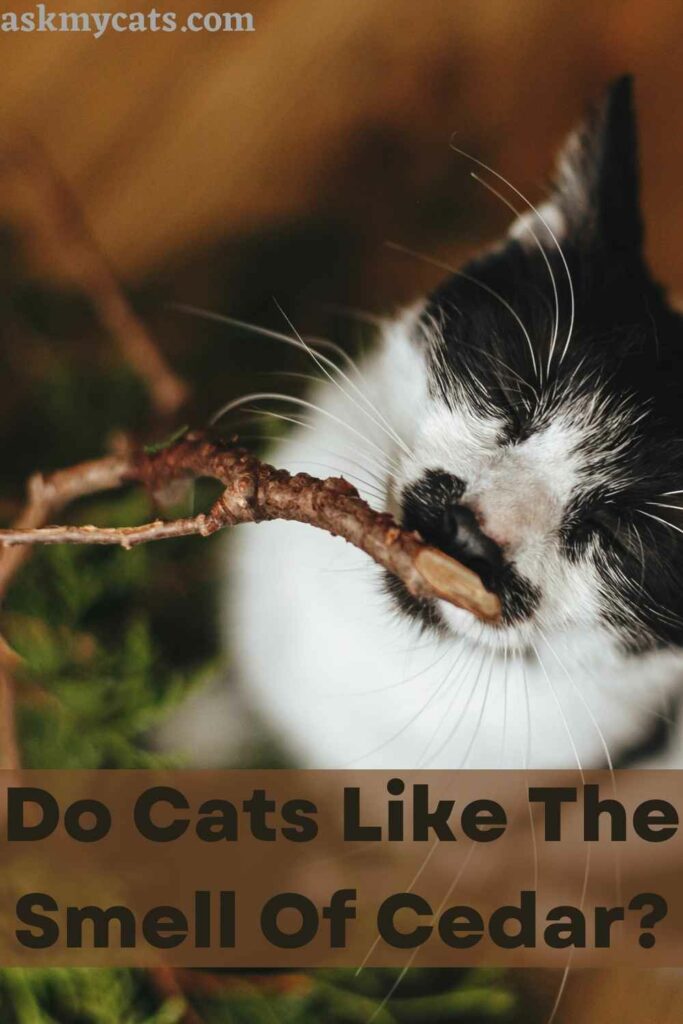Essential oils have become increasingly popular in recent years due to their numerous health, cosmetic, and wellness advantages.
Even with recent advancements in modern technology, a return to mother nature’s potent plant extracts is always a possibility. The incredible healing properties of these carrier oils for humans can actually be harmful to our four-legged friends.
However, is cedarwood oil safe for cats?
Yes, cedarwood oil is for cats, newborns, and nursing mothers if used in moderation. Not only is cedarwood safe for cats, but it actually has been proven to be lethal to adult fleas. After you have given your cat a flea bath, try adding a drop or two of cedarwood oil into their collar in order to prevent future flea infestations.
This article will talk about is cedarwood oil safe for cats how to use it around cats.


Give Your Cat the Perfect Day
Get the Free Ebook!
Can Cedarwood Oil Be Used On Cats?
Yes, cedarwood oil can be used on cats but in diluted form.
For cats, cedarwood oil may assist to reduce the presence of fleas and other bothersome insects. It may also make it simpler for stressed cats to relax and sleep.
However, because there is limited data on the usage of essential oils for pets, it’s crucial to do your homework before deciding to use them. There are several types of cedar oil, for example.
We’re talking about cedarwood atlas essential oil when we say cedarwood essential oil for cats. Some other types of cedar oil can be extremely toxic to cats, which is why we emphasize the importance of consulting with a veterinarian before using oils. It is also critical to note that essential oils should never be ingested by cats.
You may be wondering if you can use cedarwood oil around your cat if you have one. Cats’ livers are unable to break down phenol, an organic compound found in plants, so many essential oils are extremely toxic to them.
Some essential oils contain more phenol than others. Although there is a lack of evidence, cedarwood oil is thought to be relatively safe for cats.
Make sure your cat cannot ingest or come into direct contact with the oil. Also, make sure to dilute it heavily, as strong scents will most likely make pets uncomfortable.
How To Use Cedarwood Oil On Cats?
When using cedarwood oil on cats make sure to dilute it and never let your cat ingest any of it.
The method of application of cedarwood essential oil for cats is critical.
Cats, as you may know, have a much stronger sense of smell than humans.
Animals, on the other hand, have no way of telling us when they don’t like something.
When introducing new things to your cat’s environment, always consult with a veterinarian and pay close attention to your pet.
Methods to use cedarwood oil on cats are: –

1. Aromatherapy
The most secure way to use cedarwood oil for cats is probably through aromatherapy.
There are also numerous methods, some of which are superior to others when it comes to your pet.
There are two types of diffusion used in aromatherapy: passive diffusion and active diffusion. Active diffusers actually release oil particles into the air, which can be harmful to your cat’s respiratory system.
We want to make certain that we are using cedarwood oil for cats in a safe manner. This entails using aromatherapy in a passive manner.
Passive infusers include reeds, which absorb the oil, and candles/warmers, which heat the oil, mildly diffusing the scent throughout the room.
2. Topical Application
Always consult with your veterinarian before using essential oils topically on your cat. This will assist you in ensuring that you are not inadvertently using a product that could harm your beloved four-legged friend.
Also, keep in mind that cedarwood oil should never be ingested by cats in order for it to be safe. This includes not applying it to areas where your cat could lick it, such as the legs or paws.
It is also critical to understand that these oils must first be diluted. Use a carrier oil that you know is safe to use on cats and always consult a professional if you have any questions.
Does Cedar Keep Cats Away?
Yes, cedar can help you keep cats away.
Nothing is worse than a sandbox that has been converted into a litter box. Cover the sandbox with a plastic or wooden lid to keep your children’s play area safe.
Most commercial sandboxes include a lid. Design a lid during the initial construction process if you make one at home.
Don’t put sand under playground equipment because it will attract cats to your yard. Spread an 8 to 12- inch layer of playground-grade cedar chips instead. Cats will be put off by the rough texture and aromatic scent of the chips.
Do Cats Like The Smell Of Cedar?
No, most cats seem to dislike the smell of cedar.

While most trees aren’t bothersome to cats, cedar trees aren’t. The mere smell of the tree sends them running in the opposite direction.
Cats dislike cedar for a variety of reasons. While there is little scientific evidence to explain why cats dislike cedar trees, we can make assumptions based on how cats behave in the presence of the trees.
Cats dislike the smell of cedar. The smell is the primary reason why cats dislike cedar trees.
Cats are so repulsed by the odor that some people use the chips to keep stray cats away.
The branches of the cedar tree are fragile. Cedar trees’ branches aren’t as strong as those of other trees, so they’re not ideal for climbing.
If your cat has previously jumped out of a cedar tree, they may not like them in the future. For cats, something thicker, such as oak wood, is preferable.
The tree needles are painful. Cedar trees have spiny specifications that aren’t enjoyable. Your cat might get them stuck in their fur or step on them if they fall.
Unfortunately, if you live in a neighborhood with cedar trees, you’ll have to treat a lot of injuries.
They are frequently Christmas trees. Who doesn’t despise cats destroying Christmas trees?! Christmas trees are made from certain types of cedar trees.
If your cat tries to climb the Christmas tree every year, you may scold him, implying that he despises the tree. They associate being yelled at with cedar trees.
Is Cedar Smell Toxic To Cats?
No, the cedar smell is not toxic to cats.
Cedar smell is not toxic to cats, but it is likely that your cat will dislike the smell. It may be toxic in oil form, but as a normal branch or set of litter chips, it is completely safe for your cat.
Many people believe that cedar smell or trees in the cedar family are toxic to cats, but this is not true. Contrary to popular belief, the cedarwood smell is not usually toxic to cats.
Nothing bad will happen to your cat if he or she eats it or smells it. They may end up avoiding the area entirely, so it works well as a deterrent.
Even though cedarwood is not toxic, the smell of cedarwood turns off most cats. This may cause you to be concerned about the effects on your cat, but there is nothing to be concerned about.
Does Cedarwood Oil Kill Fleas On Cats?
Yes, cedarwood oil will kill fleas on cats.
Pests are one of the most common problems that cats face. Flies, moths, and fleas are just a few of the nuisances that our four-legged friends have to deal with on a regular basis.
The use of cedarwood essential oil for cats has shown some promise in terms of acting as a deterrent to these insects, according to research.
While scratching and itching can indicate that your cat has fleas, they can also be symptoms of a variety of other problems.
It is critical to consult with a veterinarian to ensure that you are not missing something more serious. Using cedarwood oil for cats can include both aromatherapy and topical application which can kill the fleas affecting your cat.
Benefits Of Using Cedarwood Oil For Cats
The benefits of using cedarwood oil for cats are: –

1. Calming Effect
Many factors can influence your cat’s mood, including health, travel, diet, and overall quality of life.
The scent of cedarwood essential oil is similar to that of the outdoors, which your cat may enjoy.
However, keep in mind that your cat’s nose is far more efficient than yours! As a result, smells will appear much stronger to your cat than to you.
When using cedarwood essential oil for cats, dilute it as much as possible to avoid causing discomfort.
2. Help In Sleeping
Cats, like humans, can suffer from insomnia on occasion. In the case of cats, insomnia is usually the result of an underlying problem, which is why we recommend consulting with a veterinarian.
However, your cat may occasionally have difficulty adjusting to a new environment or relaxing after a particularly exciting day. In such cases, using cedarwood essential oil for cats may provide some relief.
There have been very few studies on cats, but we do know that cedarwood oil contains a component called cedrol, which has sedative properties.
Human studies suggest that using cedarwood oil in aromatherapy may help improve sleep cycles. This means it’s possible it’ll have the same effect on your cat, though you should consider how sensitive your cat’s sense of smell is.
3. Boost’s Immunity
Cats, like humans, have immune systems! While each species operates in slightly different ways, the end goal is the same: to keep the body healthy.
According to research, cedarwood oil may have anti-inflammatory properties. Using a passive diffusing method, such as reeds, may benefit your cat’s overall health and well-being.
Just be sure to keep it out of reach of your cat so that they don’t accidentally ingest or come into contact with the oil. Though cedar oil is considered safe, cats can be harmed by ingesting any essential oil.
4. Behavioral Concerns
You’re not alone if your cat sits and meows at the door when you leave. Cats can express their anxiety in a variety of ways, including timidity and aggression.
If your cat appears to have a negative reaction to other animals or when left alone, essential oils may be able to help.
When considering how to use oils around cats, it is important to remember how they differ from us, as we have previously stated.
Frequently Asked Questions
Are cedar chips bad for cats?
Cedar chips are not harmful to cats. Because cedar trees aren’t harmful or toxic to cats, cedar chips aren’t either. Chipped cedar may have an even stronger odor than cedar trees. As a result, the smell of cedar chips may deter your cat from approaching them. The most serious concern about your cat being around cedar chips is that he or she will ingest them. Although the cedar chips are not toxic to your cat, the small pieces may cause your cat to choke. If your cat tries to eat them, it may get splinters from the wood in its mouth or scratch its gums.
Can cats eat cedar?
Cats can eat cedar, though it is not recommended that cats do so. As we have already covered, cedar is not toxic or harmful to cats. Eating cedar will not poison your cat. Even so, it would be best if you kept in mind that cedar is, in fact, wood. Toxic or not, your cat should not be eating or chewing on the wood of any kind. The wood can splinter into small pieces, which can be a problem if your cat ingests them. Whether they are cedar or otherwise, Eating splinters is not healthy and can lead to a trip to the emergency vet.
Can you use cedar chips as cat litter?
Cedar chips can be used as cat litter, but they are not the most comfortable for your cat to use. When it makes sense, cedar chips can be used as an alternative. It feels very different from traditional cat litter, so don’t expect your feline friend to be overjoyed. Surprisingly, cedar chips can absorb the odor of cat urine just as well as many expensive brands of cat litter. Furthermore, cedar can smell like fresh wood, which you may enjoy.
Final Words
When it comes to essential oils for cats, cedarwood oil is one of the safer options. Having said that, it is still recommended that you consult with a veterinarian before using this product. When it comes to essential oils for cats, cedarwood oil is one of the safer options. Having said that, it is still recommended that you consult with a veterinarian before using this product.
If you have any unanswered questions ask us in the comments section.

I’m doing some research on cedarwood and cats and came across your article. Being a cat owner and having been formally trained in aromatherapy by Dr. Jane Buckle, a leading authority from the U.K., I find a few things in the article that need to be addressed. Aromatherapy is not another word for diffusion. It means using essential oil therapy and all the ways that can be done. Diffusion is only one method of aromatherapy. Cats can lick everywhere on their body except behind the head/top of their necks because of their flexible spine. If an oil is not supposed to be ingested, then that is the only safe place to put it. Otherwise, they will be licking it. And, if there are multiple cats, they often groom one another. So even there isn’t safe from licking cats. I’ve done a lot of research on cedarwood for fleas on cats and from my reading, it seems that the best cedarwood for fleas (and safest for cats) is the eastern red cedar a.k.a. Juniperus Virginiana, not Atlas Cedar.
Hi there!
Thank you for reaching out and sharing your thoughts on the article. I appreciate your expertise in aromatherapy and your experience as a cat owner. It’s always great to have knowledgeable individuals contribute to the discussion.
You’re absolutely right – aromatherapy encompasses more than just diffusion, and it involves various methods of using essential oils for therapeutic purposes. I’ll definitely make sure to clarify this in the article to provide a more accurate representation of aromatherapy.
Regarding the safety of essential oils around cats, your insights are valuable. Cats have a unique physiology, and it’s essential to be cautious about the oils we use around them. I’ll include a note about being cautious when applying oils on cats and the specific safe areas where they can be used.
I’m glad you brought up the issue of cedarwood for flea control on cats. Your research on the best and safest cedarwood variety, Eastern Red Cedar (Juniperus Virginiana), is valuable information that other cat owners should be aware of. I’ll update the article to reflect this important detail.
Your input is very helpful in improving the accuracy and usefulness of the article. If you have any further insights or suggestions, feel free to share them. Thank you for taking the time to help enhance the information we provide to our readers.
If you have any more questions or need any assistance, don’t hesitate to ask. Happy researching and take good care of your furry friends!